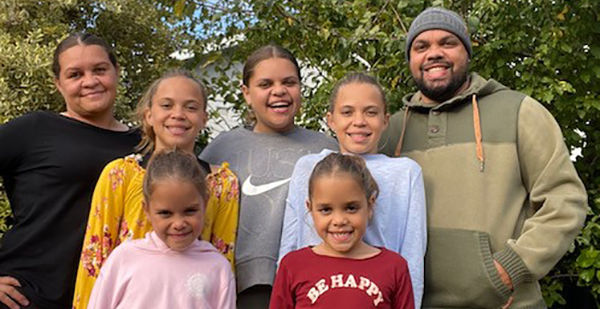Latest news
- First Nations Health Worker Traineeship (FNHWT) program launches at AHCSA
- AHCSA Sexual Health team present at Aboriginal Sexual Health Workshop, Darwin
- Aboriginal Maternal Infant Care (AMIC) course update
- 13 February 2024: National Apology Day
- Dr Lowitja O’Donoghue AC CBE DSG – 1 August 1932 - 4 February 2024
- Free Mooditj Leadership Training Course, Port Augusta
- Smoking ceremony at AHCSA
- Australia Day 2024
- AHCSA delegation meets with Federal Minister of Health & Aged Care
- SHINE SA brings Mooditj to AHCSA
- AHCSA announces management restructure
- 2023's final face-to-face class concludes at the AHCSA RTO
- AMIC Project Update: Aboriginal Maternal and Infant Care (AMIC) training back on the agenda for 2024
- AHCSA RTO: new CERT III and CERT IV classes commence
- AHCSA and members attend NACCHO annual conference
- Voice to Parliament defeated - self-care resources
- Indigenous bowel-cancer screening
- NACCHO COVID-19 Vaccination Promotion Competition 2023
- Six-week STI/BBV screening program commences at Pika Wiya
- Indigenous Voice to Parliament referendum date announced by Prime Minister Anthony Albanese
- Federal Minister of Health Hon. Mark Butler visits AHCSA
- Oodnadatta desalination plant commences operation
- Drug Alert notice: protonitazene
- NAIDOC Week 2023
- First Nations Philanthropic Funders Working Group focuses on COVID-19 preparation and recovery
- Naomi Thornthwaite and Kim Morey present at Lowitja 2023
- 2023 Lowitja Institute International Indigenous Health and Wellbeing Conference, Cairns
- Cert IV student cook-off
- National Sorry Day
- South Australian Aboriginal Health Roundtable 2023
- Celebrating new certified Aboriginal health workers
- AHCSA RTO update
- SA becomes first Australian jurisdiction to create First Nations Voice to Parliament
- AHCSA TIS team members receive awards at national conference
- AHCSA's Josh Riessen presents on Point of Care Testing for Infectious Diseases
- AHCSA delivers suicide alertness workshops in SA Far West Coast
- World Hearing Day 2023
- National Condom Day 2023
- Voluntary Assisted Dying becomes legal in South Australia
- World AIDS Day
- AHCSA's Sexual Health Team Wins People's Choice Award SH Poster!
- Media Release - AHCSA RTO
- Mparntwe Aboriginal Sexual Health NT/SA Workshop
- Dr. Annapurna Nori chats all things COVID-19 Vaccination for Kids with Gordy Rigney
- NAIDOC Week Events to Attend Across South Australia
- AHCSA Wins National Award of Recognition at 2022 NATSIEHC!
- Aboriginal Oral Health Program (AOHP)
- Yadu Health - EOI: Medical Receptionist
- World No Tobacco Day 2022 with AHCSA's Puyu Blasters
- AHCSA gives Yadu Aboriginal Health Service a Titan!
- Aboriginal Heath and Reconciliation Week With Renee Colbung
- Meet AHCSA's Quality Systems Improvement Coordinator - Venni!
- Strength and Power of Aboriginal Community Controlled Health Services in South Australia
- Is it time for an STI checkup?
- Urgent Mental Health Care Center offers an alternative to mental health support
- IWD 2022 - Celebrating AHCSA's Female Aboriginal Leaders
- AHCSA History Project
- 15 things NOT to do when using a RAT
- Fight the Bite and Mosquito Control
- The Aboriginal Flag has been freed!
- Aboriginal and Torres Strait Islander HIV Awareness Week
- South Australia's COVID-Ready Plan
- 2019/2020 Annual Report


09 May 2022
Renee Colbung is from Ceduna, South Australia and is a descendant of the Kokatha, Mirning people of the Far West Coast of South Australia and the Wongatha, Noongar and Ngaanyatjarra people of Western Australia.
She is a qualified Aboriginal Health Practitioner and has completed her Certificate IV in Aboriginal Primary Health Care with AHCSA in 2021 and has spent the last five years working in Aboriginal health.
Moving from Ceduna Kooniba Aboriginal Health Service Aboriginal Corporation (Yadu Health Aboriginal Corporation) as a CHSP Senior Case Worker, to the Port Lincoln Aboriginal Health Service as the Puyu Wanti Tackling Tobacco Action Worker.
We had a yarn to Renee about Reconciliation Week and what it means to her both personally and through an Aboriginal Health lens. The theme for Reconciliation Week in 2022 is 'Be Brave, Make Change'.
"To me reconciliation is about being able to tell the untold story of Aboriginal people around Australia," she says.
"It is important that Aboriginal people are supported and encouraged to share their stories in order for reconiliation to happen. Having an understanding of First Nations will be the way that we can become stronger together for our future."
"Understanding stories and vulnerabilities allows us to get a glimpse of walking in someone else's shoes and to create a deep connection with each other as human beings. This is what we have to do to get to a greater level of understanding in order to improve how to move forward for Reconciliation."
Renee belives that the act of Reconciliation should not only be recognised in a week of work within health and community, but that everybody should have more accountability to take steps to achieving reconciliation.
"Reconciliation has to be front of mind in daily lives and recognising this will bring about greater change moving forward. If we want change, we need to action it and include it in our lives every day, not just one week," says Renee.
Detailing her thoughts on how reconciliation could better take place in Aboriginal health, Renee says that understanding and hearing stories from those affected across Aboriginal communities and empowering them to tell their stories about the prejudices they experience, racism, exclusion, issues relating to removal of children and how this impacts on people's health and well-being should be prioritised.
"This would give others greater insight into the challenges that our people experience so we can develop better responses to support Indigenous people" Renee says.
"This would also be a great way for the younger generation to understand what happened and how they can commit to ensuring that bad things like that never happen again."


 Back to all news items
Back to all news items